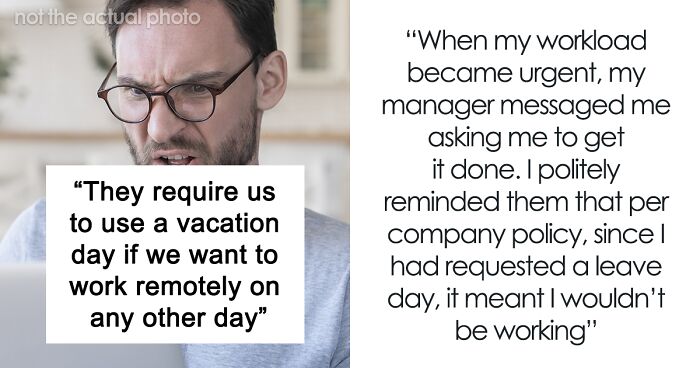
Boss Refuses To Let Sick Employee Work From Home, Regrets It After Facing The Consequences
As companies scrambled to comply with lockdowns and social distancing policies during Covid, many discovered the benefits that come with remote work. But not all of them.
In a post on r/MaliciousCompliance, Reddit user Ball-Realistic explained that even though they could have easily completed their duties from their home office, management insisted on employees being physically present at the workplace.
However, their stubbornness backfired when Ball-Realistic got sick at a particularly busy time and decided to play by the same rules.
This employee had no choice but to take a day off when they got mildly sick because management didn’t let them work from home
Image credits: insidecreativehouse/Envato elements (not the actual photo)
However, the company soon regretted their decision
Image credits: YuriArcursPeopleimages/Envato elements (not the actual photo)
Image credits: Ball-Realistic
There’s a myriad of ways employers can damage an otherwise good atmosphere
Most of us spend 81,396 hours of our life working. Since we dedicate that much time to it, we have to at least try and find a professional space that doesn’t feel like it’s sucking the joy out of us.
Whether it’s one day per week, two, or more, some businesses have been recently observed to use remote work opportunities to try and hide other corporate issues. This doesn’t necessarily mean that our Redditor’s employers are doing it, but some bosses think they can fool their staff this way.
“Just because a company offers remote work, does not guarantee a positive work environment,” Toni Frana, Lead Career Expert at FlexJobs told Bored Panda in a statement. “With work-from-home models now a permanent fixture for many organizations, it’s critical that today’s professionals can recognize the most prevalent pitfalls and warning signs of a toxic workplace.”
Image credits: LightFieldStudios/Envato elements (not the actual photo)
According to the team at FlexJobs, here are the ten biggest remote workplace red flags to know in 2024:
- Employee monitoring and micromanaging. According to a recent FlexJobs survey, the use of remote employee surveillance is considered an invasion of privacy by 67% of workers. Similarly, micromanagement was ranked in another FlexJobs survey as one of the top three behaviors of toxic managers, along with poor communication and dismissive behavior. The use of employee monitoring software and constant questioning about time allocation can create a lack of trust and a hostile work environment. Instead, employers should empower their workers to manage time effectively and trust them to deliver results without excessive policing.
- Lack of communication. Poor communication structures and inconsistent processes for feedback can lead to frustration and confusion among employees. In a healthy remote workplace, there will be clear guidelines from HR and management on how to communicate with colleagues, as well as established channels, for providing and receiving feedback. When reading job descriptions, pay attention to statements encouraging open communication through check-ins, feedback, and clear reporting structures.
- Blame culture. A healthy culture of accountability, empowerment, and open communication is key, particularly for remote workplaces. Conversely, a lack of accountability can lead to dishing blame, stifled growth, and complacency. So while researching employers, look for potential signs of blame culture, such as gossip, ambiguous team responsibilities, or a lack of clear performance expectations.
- No work-life boundaries. Employers who expect remote workers to respond to after-hours emails and messages can instill an “always-on” mentality and drive employee burnout. In a remote environment, which can easily blur the lines between work and personal life, it’s crucial to maintain not just productivity but also well-being.
- Limited social interactions. Remote work can lead to isolation and loneliness. Workers should be mindful of companies that do not offer opportunities for socializing, such as small talk in meetings or on-the-clock, virtual social events. A healthy remote workplace culture, on the other hand, will build a sense of community and belonging, even if teams are meeting virtually.
Image credits: ckstockphoto/Envato elements (not the actual photo)
- Outdated remote tools. Insufficient budgets for tools necessary for effective work and collaboration can lead to challenges that would be easily avoided otherwise. Employers should provide the means that facilitate seamless collaboration and communication, such as video conferencing platforms, project management software, and secure file-sharing solutions.
- Favoritism. Neglect of quieter and more reserved remote team members can create psychologically unsafe workplaces. Be mindful of employers who favor extroverted employees over introverted ones.
- Information silos. Difficulty obtaining information and discouragement of interaction between remote teams can lower productivity and innovation. Instead, employers should promote transparency, information sharing, and cross-functional communication for a cohesive and collaborative work environment.
- Unequal promotions. Differences in career paths for remote employees compared to in-person or hybrid workers can be a big red flag. In a healthy workplace, employers offer equal opportunities for career advancement, regardless of the employee’s work location.
- Resistance to change. Inflexible approaches, inability to keep up with competition, and failure to adopt new technologies not only impact an organization’s success but can also promote toxicity. Employers who are open to change, embrace new ideas, and are willing to adapt to the evolving demands of the modern workplace are often those with the happiest employees.
“By building awareness of these common red flags, we hope professionals can make more informed decisions about their employment opportunities and prioritize their career goals, healthy work-life balance, and overall well-being,” Frana said.
As the story went viral, its author provided more information on the whole ordeal in the comments
Some people shared their own similar experiences
And folks have had a lot of strong reactions to such a blatant display of corporate stubbornness
Poll Question
Thanks! Check out the results:
I work for an ad agency. Fully remote as 70% of employees and counting. The agency is growing, our benefits keep getting better, we're winning ad awards, the turnover rate is minuscule...
4% of people who voted think this is a fair policy? Are you all brain damaged? Most likely you're the people who come up with BS policies like this.
I don't understand about a multi-purpose day off. In my job we have a clear understanding that we have paid vacation days, unpaid days off, paid days off to attend exams for regulated studies. Paid sick days, and paid days for personal matters, some of these days we can divide them into hours and take them on different days.
Here we do not even have „sick days“. If you are sick, you tell them and can stay 3 days home. If you are sick for a longer period, you go to the doctor for a doctors note and stay home. For however long it takes. Paid. No limit. Sick is sick. You can‘t help being sick. And if you get sick during your vacation, you get your vacation days back. Vacation is relaxation time and should be used for exactly that, nothing else.
Load More Replies...I work for an ad agency. Fully remote as 70% of employees and counting. The agency is growing, our benefits keep getting better, we're winning ad awards, the turnover rate is minuscule...
4% of people who voted think this is a fair policy? Are you all brain damaged? Most likely you're the people who come up with BS policies like this.
I don't understand about a multi-purpose day off. In my job we have a clear understanding that we have paid vacation days, unpaid days off, paid days off to attend exams for regulated studies. Paid sick days, and paid days for personal matters, some of these days we can divide them into hours and take them on different days.
Here we do not even have „sick days“. If you are sick, you tell them and can stay 3 days home. If you are sick for a longer period, you go to the doctor for a doctors note and stay home. For however long it takes. Paid. No limit. Sick is sick. You can‘t help being sick. And if you get sick during your vacation, you get your vacation days back. Vacation is relaxation time and should be used for exactly that, nothing else.
Load More Replies...
 Dark Mode
Dark Mode 

 No fees, cancel anytime
No fees, cancel anytime 










































































14
17